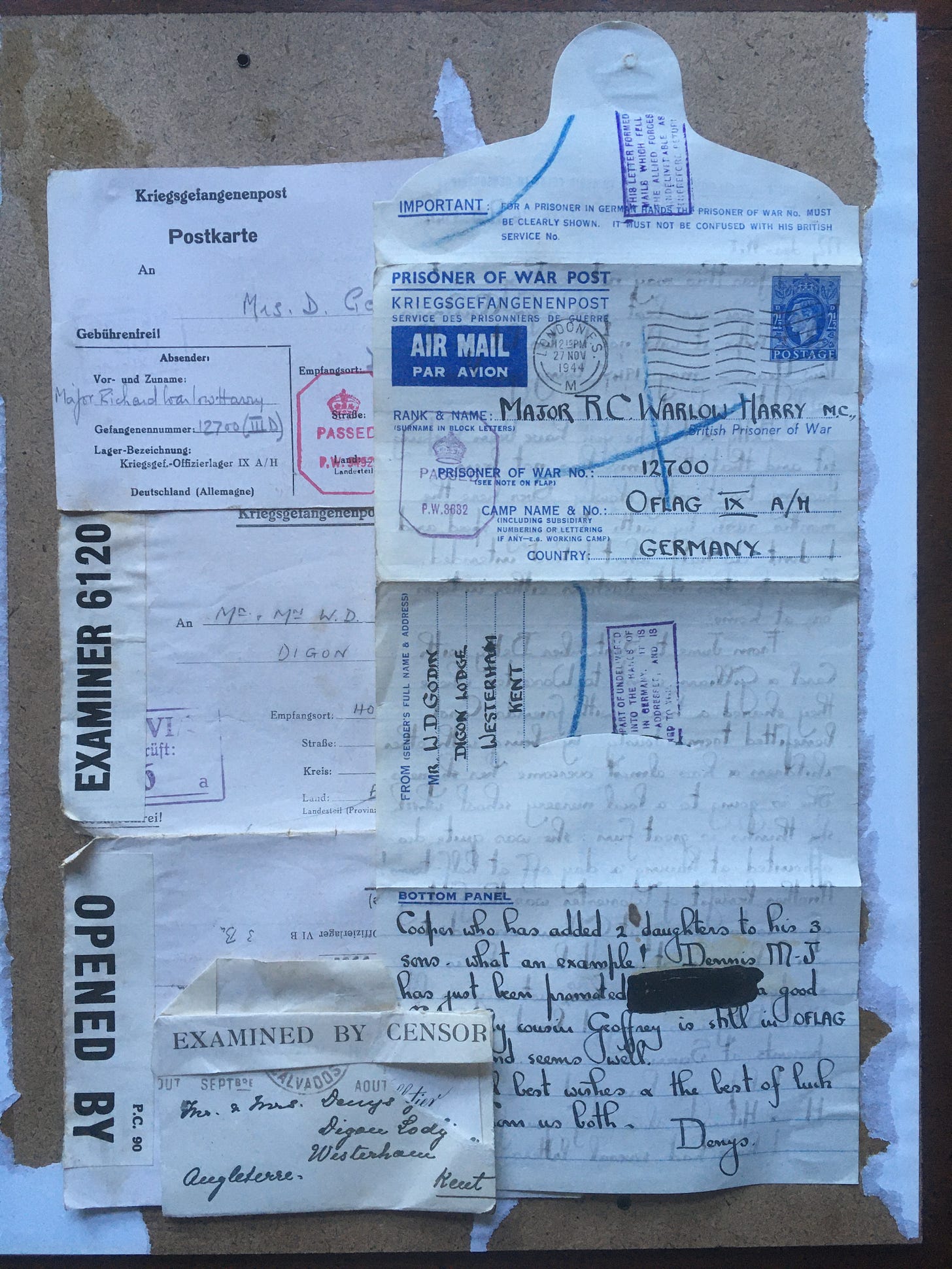On 27th November 1944, my grandfather Denys Godin sent a letter to his former schoolfriend, Richard Christopher Warlow-Harry, a Major in the British army and at that point prisoner of war number 12700 at Oflag IX / A-H, Germany.
An Oflag, from the German Offizierslager, was a prisoner of war camp for officers, set up in accordance with the requirements of the 1929 Geneva Convention. Oflag IX / A-H was located in Spangenberg Castle in northeastern Hesse, Germany. What had been the banqueting hall of this fairy tale castle served now as a dormitory packed with double bunk beds. The guards were infamously harsh. Pigs roamed the moat. In his 1992 autobiography, Life Hangs By a Silken Thread, former prisoner-of-war and serial escaper Eric Foster (1903-2006) described Spangenberg ‘as the end of hope’.
In the letter, one portion has been crudely obscured by the censor: the point at which my grandfather is discussing the promotion of a family friend.
The thick black ink is at first shocking, but, as a mechanism of military intelligence, it soon looks pretty impotent. The impression is of a mix of care and clumsiness: care at the covering up of a single short clause that leaves the rest of the letter untouched; and clumsiness at the simple literalism of it. How many thousands of pages of this kind of hollowed-out news from Britain – already muted before the black pen got to it – did the censor have to read? The effect is something like the reverse of the censor’s intention: the block of black ink marks out significance, rather than hiding it, and while we can’t read the words below, we do come away remembering that Dennis M-J has just been promoted. We become more attentive to the text surrounding the censor’s ink than we would otherwise have been.
If words are not blacked out, but only partially obscured, the effects are more complicated. Here is an instance of this variety of deletion, from exactly 300 years earlier than the letter to Spangenberg Castle. John Milton’s Areopagitica (1644), was published unlicensed, unregistered, and with no note of publisher or printer, at the height of the English Civil War: it offered Milton’s famous defence of freedom of expression, and his argument against the licensing and censorship of the printing press. In the passage below, Milton describes the good reader as one who battles with error as well as truth, and is strengthened as a result.
In this passage, Milton describes this virtuous reader as ‘the true wayfaring [or journeying] Christian’. But in many copies, the ‘y’ of ‘wayfaring’ has been struck through with an ‘r’ added above, and ‘wayfaring’ becomes a more belligerent ‘warfaring’. It looks like Milton’s hand. The change might indicate a mistake by the compositor or the scribe who prepared the print-shop copy, but it might also be an authorial second-thought, after the book was published – Milton’s l'esprit d'escalier. Quick! Before you sell them all! Most modern editions, like the Yale edition of Milton’s prose, go with ‘warfaring’. But unlike the 1944 censor who blotted out entirely Dennis M-J’s new rank, Milton’s strikethrough leaves the older version still visible, and we don’t have to choose. Milton’s cancellation – that isn’t quite the right word – doesn’t replace one word with another, but establishes a relationship between two words.
How do we read this?
Probably by toggling between ‘y’ and ‘r’, holding both ‘wayfaring’ and ‘warfaring’ in our head at the same time, and wondering, as we see the print and Milton’s handwritten annotation, about the difference between the two – about Milton’s intentions – about what, exactly, happened in the print-shop when the compositor came to this word. Milton’s little strikethrough introduces a whole new set of questions: this is deletion as expansion.
There’s a long history of Milton’s text being struck through. Erasure – or blackout – poetry works on a prior text, obscuring words to produce new meanings. Ronald Johnson’s Radi Os (Sand Dollar Press, 1977; reprinted by Flood Editions, 2005) is a revision (again: the word isn’t quite right) of the first four books of Milton’s Paradise Lost (1667). Johnson deleted most of Milton’s poem to leave a small number of words standing alone on the white of the page: ‘I omit most of the text,’ Johnson said, ‘to create a Blakeian visual page and a new Orphic text of my own.’ In Johnson’s poem, God and Satan are removed; his title is Milton’s title, but pruned back: [Pa]radi[se L]os[t].
Here you can see the opening of Milton’s great poem, on the left, and Johnson’s response:
Johnson worked on an 1892 edition of Paradise Lost, and below you can see his deletions that produce a slightly different version from the one above – the working draft, before the white-page finished text. (Notice too the nice bleed-through from the verso: the sound of deletions over the horizon).

In Johnson’s Radi Os, words are effaced in the manner that a path might be cleared through a dense wood: by cutting back text, other meanings (already present, but obscured) come into view, and pieces of text that were hemmed in by their surroundings find new formations. In this sense, Johnson’s Radi Os was always there in Milton’s Paradise Lost, but it took Johnson’s strikethroughs to reveal it.
More erasures
Recent examples of erasure writing include Jen Bervin’s Nets (Ugly Duckling Presse, 2003), responding to Shakepeare's Sonnets (1609); The O Mission Repo by Travis Macdonald (Fact-Simile Editions, 2008), which reworks the 9/11 Commission Report; Janet Holmes’s The MS of my kin (Shearsman Books, 2009), which uses Emily Dickinson’s poetry; and Austin Kleon’s Newspaper Blackout (Harper, 2010).









Reading through Don Paterson's latest book of aphorisms ("The Fall at Home") I found this:
"A student brings me a Xerox of a page of 'Henderson the Rain King', with most of the words whited out to reveal what I assume was a poem. 'What's this?' I ask. 'It's an "erasure" poem', he replies. I tell him it's half-finished. The remark passes over him, silently and very high, like the Hubble telescope. I have a loathing of all art made *procedurally*, which makes me want to smash it for the mere sake of introducing into it some minimal human warmth."
Preceded by "I preferred not to think that no one had come, but rather that my reading was being held in total secrecy"... Hmm, any connection, I wonder?
Mike
A most interesting article, which I enjoyed reading not least because Major RC Warlow-Harry-Harry is my grandfather...!